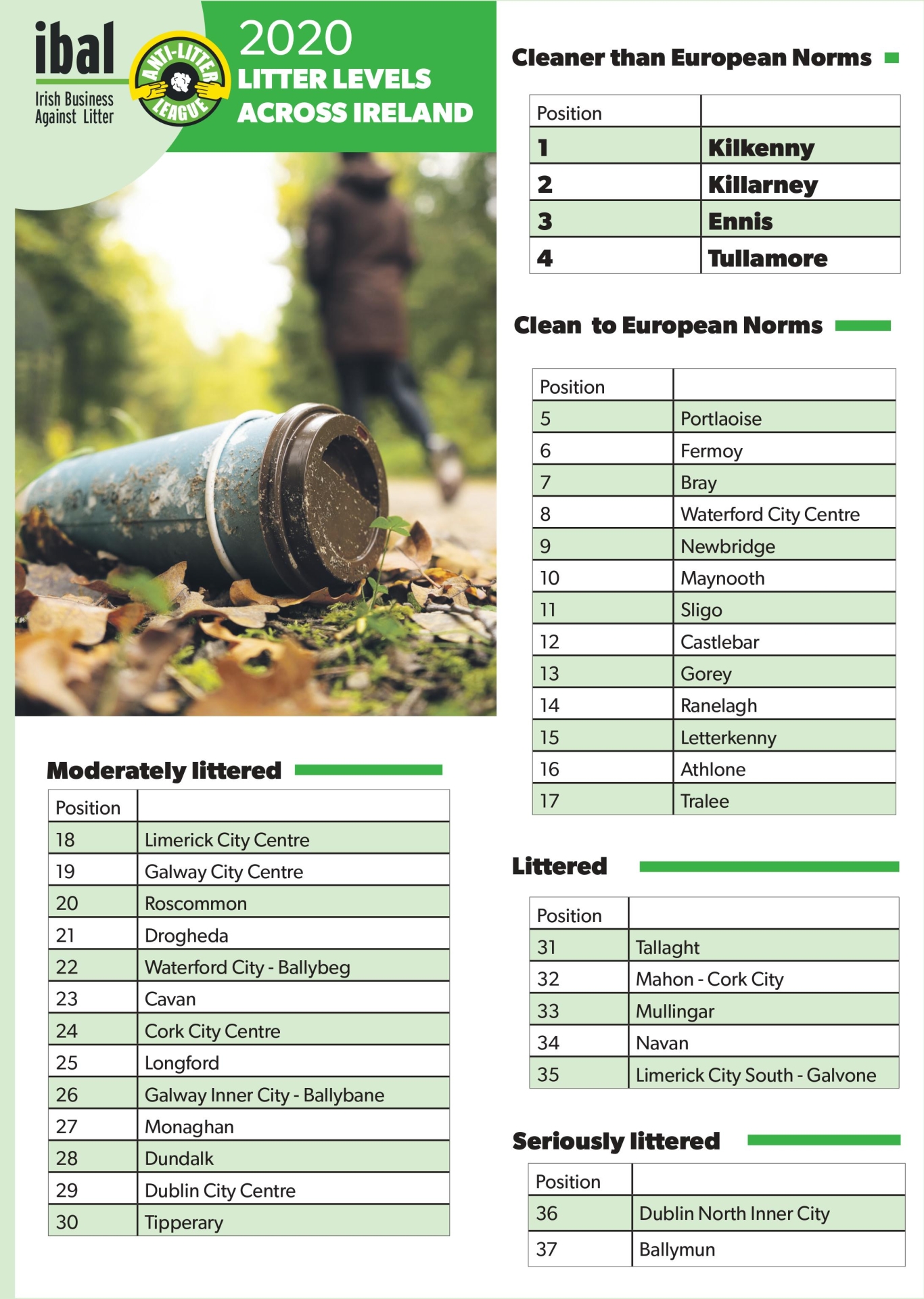
Disappointing result as Longford slips in IBAL litter league rankings
Having failed to attain clean status, there was disappointment for Longford town as it slipped to the 25th in the IBAL litter league rankings.
The second nationwide litter survey by Irish Business Against Litter (IBAL) since the Covid-19 pandemic hit shows that previous winner Longford was still ‘moderately littered’ and it dropped one place, from 24th to 25th, in the ranking of 37 towns and cities.
The An Taisce report for Longford stated: “Some disappointment for Longford after an improved result last summer. Top-ranking sites included the residential area of The Laurels, St. Mel’s Park / Sports Ground and St. Mel’s Cathedral – these sites were not just good with regard to litter but exceptionally freshly presented and maintained.
"The N63 Longford approach was brought down by a combination of heavy levels of litter along the road, combined with two isolated areas which had significant litter problems. The ‘Bring Centre’ / Recycle Bank at Library was also a very poor site.”
In all, litter levels rose in 24 of the 37 towns and cities inspected by An Taisce at the end of 2020, resulting in only 17 being judged to be clean – a fall of over 25% on last summer and in sharp contrast to just 3 years ago, when 80% were clean.
The overall winner was Kilkenny.
According to IBAL, the survey results are consistent with a trend in recent years.
“The decline in cleanliness is less a case of the poorer areas getting worse, but of previously clean towns slipping to littered,” says IBAL spokesperson Conor Horgan.
“Covid is clearly a factor here, but we should never accept litter as inevitable. It comes down to people disposing of their waste without regard for their surroundings or their fellow citizens and it is entirely unnecessary.”
One explanation for the rise in litter lies in the restrictions surrounding cleaning services during the pandemic.
“While council workers have not been on the streets as much as normal, the general public has been spending more time than ever out of doors,” says Mr Horgan.
There was a sharp rise in the amounts of litter on approach roads to towns, reflecting the fact that the benign winter has seen masses of people out walking. “Ironically, too many of them are showing a shameful disregard for the environment they are enjoying.”

PPE litter
Coffee cups were among the most prevalent litter types found, while there was another rise in glass bottles and cans, suggesting that outdoor drinking has not waned over the winter months. The survey also showed that the second half of 2020 brought a further increase in PPE-related litter, primarily masks.
“Eight months into the pandemic, we would have hoped people would have moved to reusable masks with a resulting fall in mask-related litter. In fact, we are seeing more and more of them ending up our streets,” says Mr Horgan.
Heavily littered sites ‘getting worse’
The report highlighted a continued rise in the number of blackspots in towns and cities. IBAL was once again critical of the failure of local authorities to address sites that had been identified in previous surveys as heavily littered. 36 such sites were revisited in this latest survey, yet only 11% were found to have been cleaned up and more than a quarter had actually worsened.
Reluctance to pick up litter
According to IBAL, the reluctance among civic-minded people to pick up litter during the pandemic may carry long term consequences. “While people have certainly become more attuned to their natural surroundings and more conscious of how litter can spoil those surroundings, this is offset by an understandable unwillingness to pick up waste for fear of contamination. As the pandemic endures, and with it the sensitivity around touching items, people may simply get out of the habit of picking up other people’s litter. We risk losing a civic behaviour which is vital in keeping our country clean.” concludes Mr Horgan.
Subscribe or register today to discover more from DonegalLive.ie
Buy the e-paper of the Donegal Democrat, Donegal People's Press, Donegal Post and Inish Times here for instant access to Donegal's premier news titles.
Keep up with the latest news from Donegal with our daily newsletter featuring the most important stories of the day delivered to your inbox every evening at 5pm.